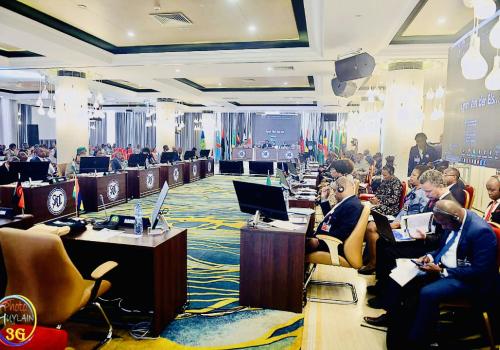The Joint Meeting of the Committee of Ministers responsible for Education and Training and Science, Technology, and Innovation of the Southern African Development Community (SADC) met on the 23rd June 2023 in Kinshasa, Democratic Republic of Congo, to review progress in the implementation of the SADC protocols, policies and programmes related to the these sectors. The meeting was chaired by Honourable Muhindo Nzangi Butondo, the Minister of Higher and Tertiary Education of the Democratic Republic of Congo and Chairperson of the Joint Committee of Ministers responsible for Education and Training and Science, Technology, and Innovation.
In his opening remarks, Hon. Nzangi Butondo shared progress made by the Democratic Republic of Congo in the promotion of education of vulnerable people and government`s various policy- based approaches to combat inequalities of access to basic services of lifelong education. He further emphasised various projects that continues to contribute to youth employment in DRC.
The SADC Deputy Executive Secretary for Regional Integration, Ms. Angèle Makombo N`Tumba, highlighted the importance of the approved SADC Vision 2050 and Regional Indicative Strategic Development Plan (RISDP) (2020-2030), both of which Education and Training and Science, Technology and Innovation are critical components of regional integration under Pillar 1 on Industrial Development and Market Integration and Pillar 3 on Social and Human Capital Development.
Ms. N’Tumba updated the meeting of the progress towards operationalisation of the SADC University of Transformation (SUT) which, once established, will focus on entrepreneurship, innovation, commercialisation, technology transfer, enterprise development, digital and knowledge economy, to support the SADC industrialisation agenda. In this regard, the SADC Deputy Executive Secretary informed the meeting that the SADC Secretariat, with the financial support of the Deutsche Gesellschaft für Internationale Zusammenarbeit (GIZ) and technical support from the Southern Africa Regional Universities Association (SARUA), convened the Vice Chancellors Meeting in January 2023 on the operationalization of the SUT which recommended further engagement with other stakeholders.
During the meeting, the Ministers considered a Report from the Special Technical Committee on Certification and Accreditation Meeting which provides the roadmap for the various implementation strategies towards the implementation of the Southern African Development Community Qualifications Framework (SADCQF) over the next four years. Measures proposed include implementation and reviewing of the SADCQF Guidelines and Manuals on Recognition of Prior Learning, the SADC Credit Accumulation Transfers systems, and the SADC Recognition Manual; moving towards referencing rather than alignment to the SADCQF; and focusing on new developments namely on issues such as digitalisation, micro-credentials and common profiles of qualifications, amongst other things.
The Ministers further;
- endorsed the recommendations from UNESCO to implement programmes in Open Science and Access in line with the UNESCO Recommendation on Open Science, which provides an International Framework for Open Science Policy and practice that recognises disciplinary and regional differences in open science perspectives.
- commended UNESCO, in collaboration with the Government of the Republic of Namibia through the Ministry of Higher Education, Technology and Innovation for having organised the Southern Africa sub-Regional Forum on Artificial Intelligence (AI), in Windhoek, September 2022 under the theme “Towards a sustainable development-oriented and ethical use of artificial intelligence”. The Forum adopted the Windhoek Statement on Artificial Intelligence recognising that AI is fast transforming the world and the future of humanity, raising complex questions and blurring traditional boundaries of the physical, digital and biological worlds, influencing human thinking, interaction and decision-making etc. and therefore recommends for the development and ethical use of the AI in Southern Africa.
- considered the draft SADC Digital Transformation Strategy (DTS), whose overarching objective is to drive and accelerate the strategic adoption of digital technologies by and in all SADC Member States, digitally empowering citizen’s businesses and institutions, and therefore maximising the economic, social and political impact of the use of digital technologies for the benefit of SADC people’s quality of life and in favour for fulfilling SADC’s regional development agenda. This regional strategy identifies key strategic capacities and capabilities for the Fourth Industrial Revolution (4IR). The SADC DTS highlights key interventions towards addressing the building blocks and the foundations of the digital economy.
- considered progress on the implementation of the SADC Charter on establishing the Women in Science, Engineering and Technology Organization (WISETO). Eleven Member States signed the Charter bringing the total to two-thirds majority of signatures, meeting the requirements for the Charter to enter into force. The next steps are to develop a roadmap establishing the regional Organization on Women in Science, Engineering and Technology. The Ministers also directed the Secretariat to initiate a process to identify the host country for the SADC Women in Science, Engineering and Technology Organization and report at the next meeting in 2024.
The Joint Meeting of Committee of Ministers responsible for Education and Training and Science, Technology, and Innovation was attended by Ministers and representatives from Angola, Botswana, Democratic Republic of Congo, Eswatini, Lesotho, Malawi, Mozambique, Namibia, United Republic of Tanzania, Zambia, and Zimbabwe.
The meeting was also attended by representatives from International Cooperating Partners, United Nations Agencies, Implementing Agencies and Development Partners responsible for these sectors.

